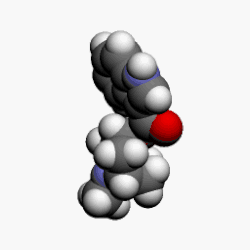Tropisetron
 | |
 | |
| Names | |
|---|---|
| Trade names | Navoban, Setrovel, others |
| Other names | ICS 205-930 |
IUPAC name
| |
| Clinical data | |
| Drug class | 5-HT3 receptor antagonist[1] |
| Main uses | Chemotherapy-induced nausea and vomiting[1] |
| Side effects | Diarrhea, dry mouth[2] |
| WHO AWaRe | UnlinkedWikibase error: ⧼unlinkedwikibase-error-statements-entity-not-set⧽ |
| Pregnancy category |
|
| Routes of use | By mouth, IV |
| Typical dose | 5 mg OD[1] |
| External links | |
| AHFS/Drugs.com | International Drug Names |
| Legal | |
| Legal status |
|
| Pharmacokinetics | |
| Bioavailability | ~60–80% |
| Protein binding | 71% |
| Metabolism | Liver (CYP3A4, CYP1A2, CYP2D6) |
| Elimination half-life | 6–8 hours |
| Excretion | Kidney, Fecal |
| Chemical and physical data | |
| Formula | C17H20N2O2 |
| Molar mass | 284.359 g·mol−1 |
| 3D model (JSmol) | |
SMILES
| |
InChI
| |
Tropisetron, sold under the brand names Navoban among others, is a medication mainly used to for chemotherapy-induced nausea and vomiting.[1] It may be used with dexamethasone for greater effect.[1] Benefits are similar to ondansetron.[1] It can be taken by mouth or by injection into a vein.[1]
Side effects may include diarrhea, dry mouth, and headache.[2][3] Other side effects may include allergic reactions.[3] Safety in pregnancy is unclear.[4] It is a 5-HT3 receptor antagonist.[1]
Tropisetron was patented in 1982 and approved for medical use in 1992.[5] It is on the World Health Organization's List of Essential Medicines as an alternative to ondansetron.[6] It is available in Europe but not the United States.[7][8]
Medical uses
Dosage
The typical dose is 5 mg once per day.[1]
Side effects
Tropisetron is a well-tolerated drug with few side effects. Headache, constipation, and dizziness are the most commonly reported side effects associated with its use. Hypotension, transient liver enzyme elevation, immune hypersensitivity syndromes and extrapyramidal side effects have also been associated with its use on at least one occasion. There have been no significant drug interactions reported with this drug's use. It is broken down by the hepatic cytochrome P450 system and it has little effect on the metabolism of other drugs broken down by this system.
Pharmacology
Tropisetron acts as both a selective 5-HT3 receptor antagonist and α7-nicotinic receptor agonist.[9][10]
Other uses
As a biological stain and as trypanocide
See also
References
- 1 2 3 4 5 6 7 8 9 Simpson, K; Spencer, CM; McClellan, KJ (June 2000). "Tropisetron: an update of its use in the prevention of chemotherapy-induced nausea and vomiting". Drugs. 59 (6): 1297–315. doi:10.2165/00003495-200059060-00008. PMID 10882164.
- 1 2 Aronson, Jeffrey K. (11 April 2014). Meyler's Side Effects of Drugs 15E: The International Encyclopedia of Adverse Drug Reactions and Interactions. Newnes. p. 1366. ISBN 978-0-444-51005-1. Archived from the original on 10 September 2023. Retrieved 9 September 2023.
- 1 2 "Tropisetron Hydrochloride". web.archive.org. MedSafe. 28 September 2007. Archived from the original on 28 September 2007. Retrieved 9 September 2023.
{{cite web}}: CS1 maint: bot: original URL status unknown (link) - ↑ "TROPISETRON-AFT". NPS MedicineWise. 3 August 2015. Archived from the original on 5 November 2022. Retrieved 9 September 2023.
- ↑ Fischer J, Ganellin CR (2006). Analogue-based Drug Discovery. John Wiley & Sons. p. 448. ISBN 9783527607495. Archived from the original on 2023-01-12. Retrieved 2022-05-29.
- ↑ World Health Organization (2021). World Health Organization model list of essential medicines: 22nd list (2021). Geneva: World Health Organization. hdl:10665/345533. WHO/MHP/HPS/EML/2021.02.
- ↑ Lemke, Thomas L.; Williams, David A. (24 January 2012). "Foye's Principles of Medicinal Chemistry". Lippincott Williams & Wilkins. Archived from the original on 10 September 2023. Retrieved 9 September 2023.
- ↑ Feldman, Liane S.; Delaney, Conor P.; Ljungqvist, Olle; Carli, Francesco (31 August 2015). "The SAGES / ERAS® Society Manual of Enhanced Recovery Programs for Gastrointestinal Surgery". Springer. Archived from the original on 10 September 2023. Retrieved 9 September 2023.
- ↑ Macor JE, Gurley D, Lanthorn T, Loch J, Mack RA, Mullen G, et al. (February 2001). "The 5-HT3 antagonist tropisetron (ICS 205-930) is a potent and selective alpha7 nicotinic receptor partial agonist". Bioorganic & Medicinal Chemistry Letters. 11 (3): 319–321. doi:10.1016/S0960-894X(00)00670-3. PMID 11212100.
- ↑ Cui R, Suemaru K, Li B, Kohnomi S, Araki H (May 2009). "Tropisetron attenuates naloxone-induced place aversion in single-dose morphine-treated rats: role of alpha7 nicotinic receptors". European Journal of Pharmacology. 609 (1–3): 74–77. doi:10.1016/j.ejphar.2008.12.051. PMID 19374878.
External links
| Identifiers: |
|
|---|
- Navoban data sheet Archived 2007-09-28 at the Wayback Machine